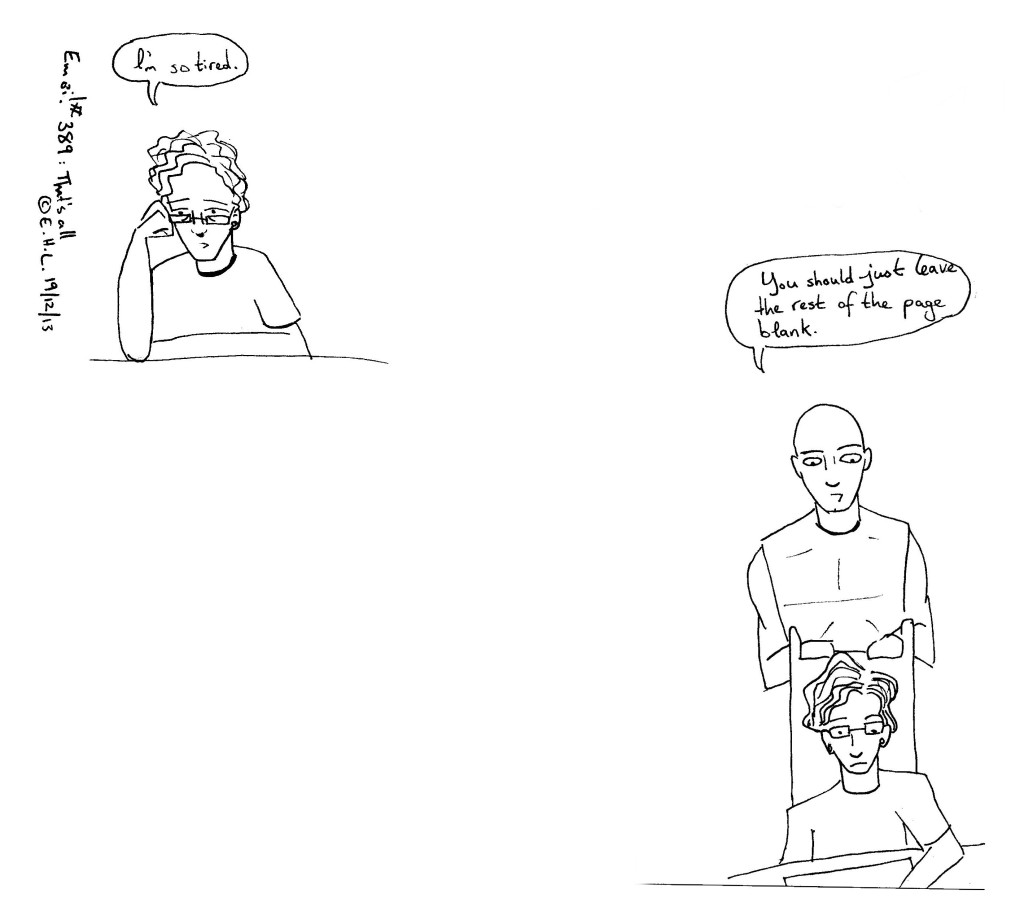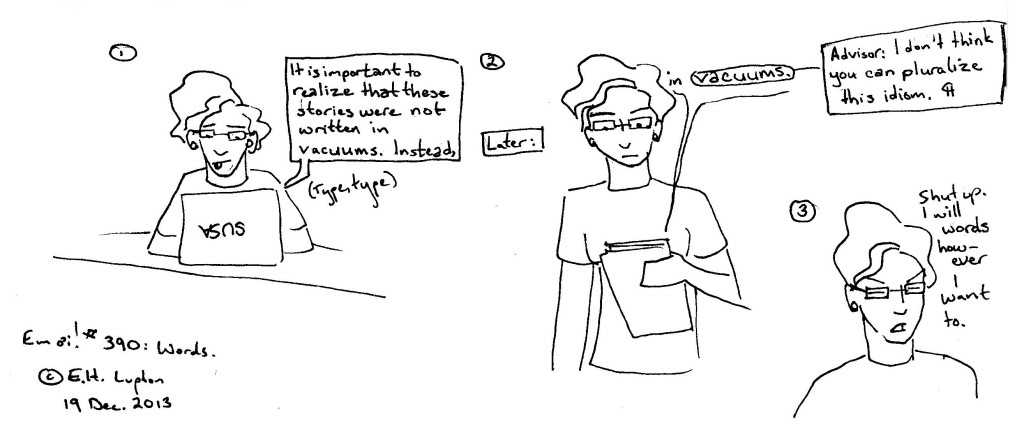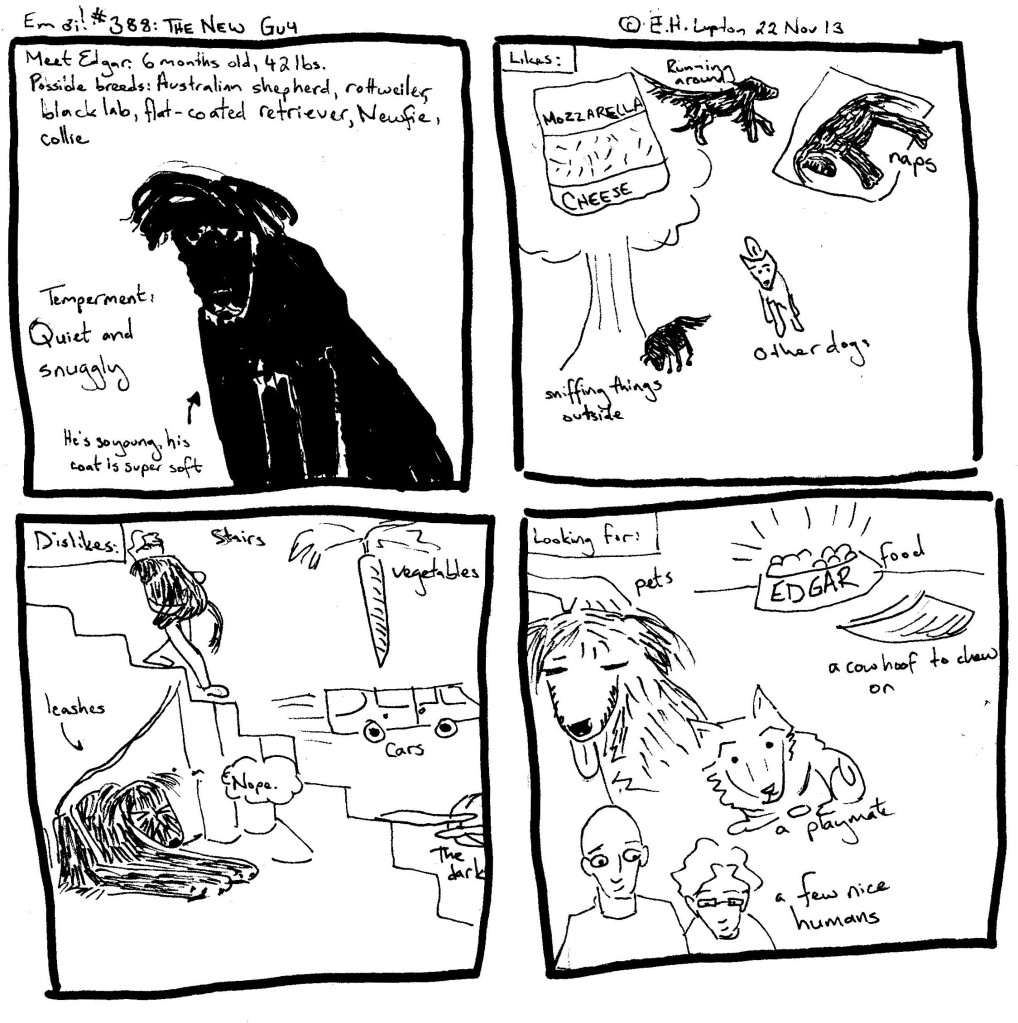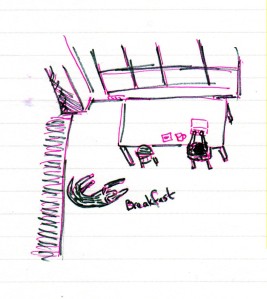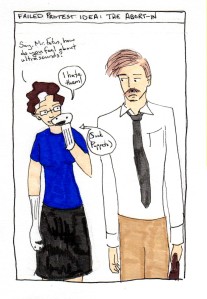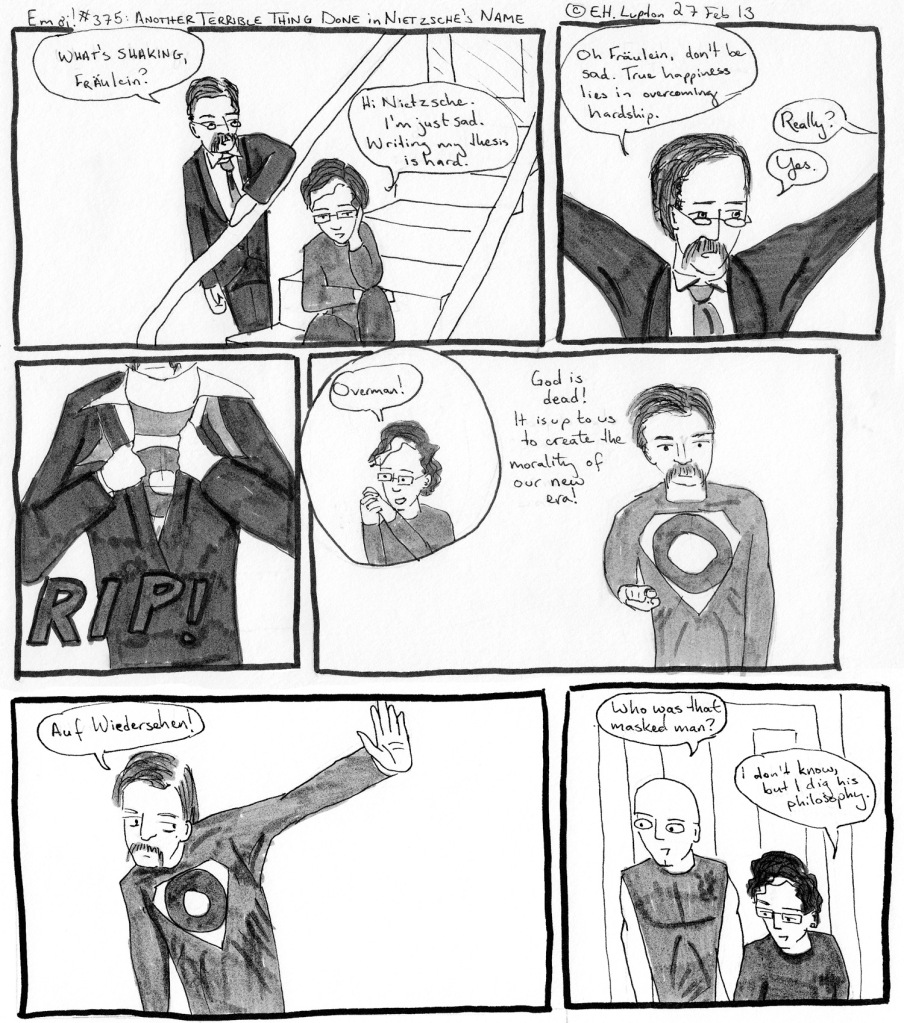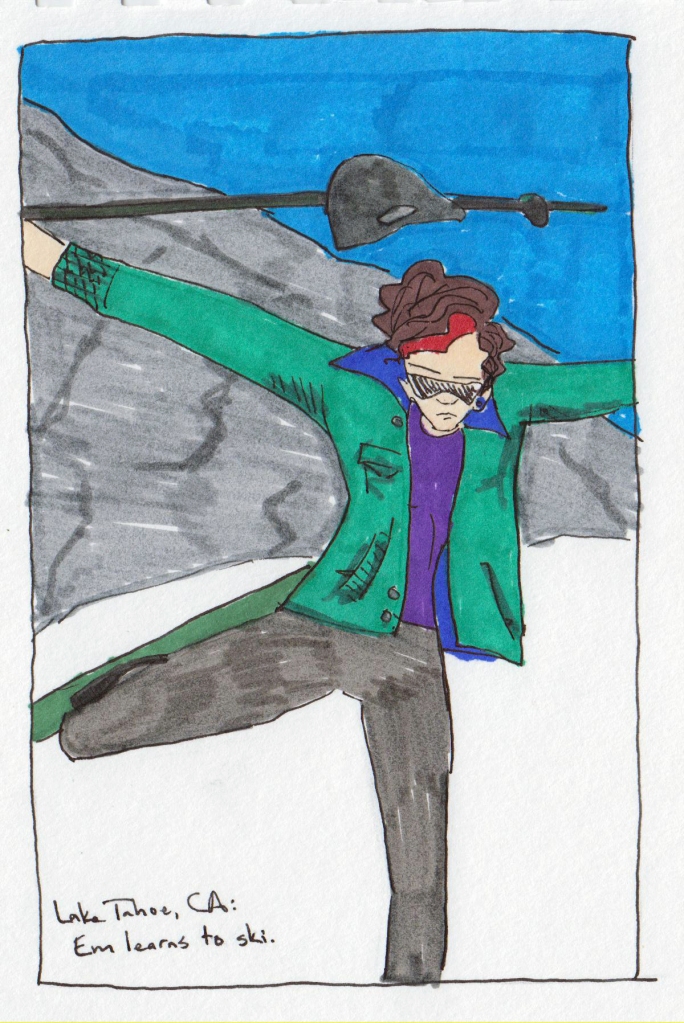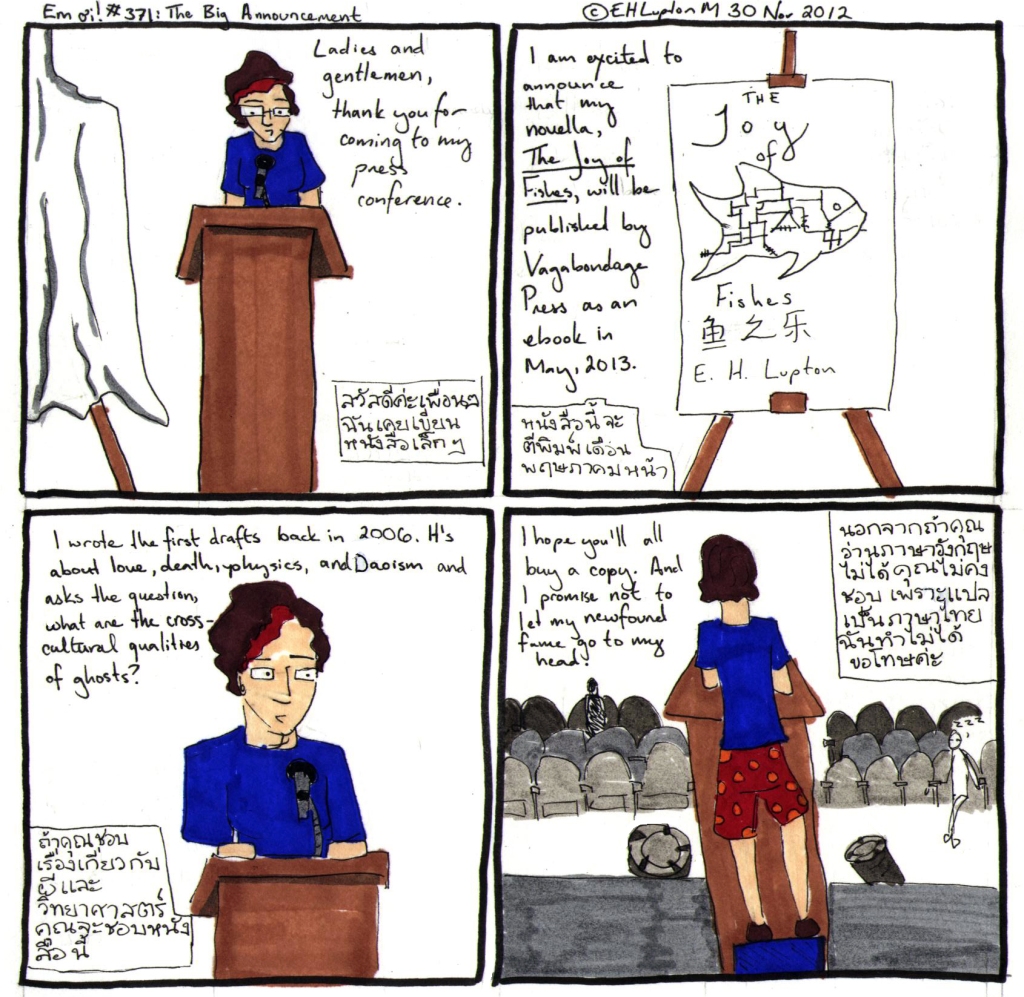Note: I started a new job last week, which has temporarily reduced my available time for drawing. Also I am doing battle with the wallpaper in our first floor bathroom, so that is taking up a lot of my time. I hope I’ll have a comic next week. In the meantime, please enjoy a few of the reviews I write.
Žižek, Slavoj. First as Tragedy, Then as Farce. London and New York: Verso, 2009. 978-1-84467-428-2
So here are the things you need to know about Žižek: First, if you decide to write about him, his name is kind of a typographical clusterfuck for the English keyboard. Second, he’s a Marxist. Third, he’s essentially an intersectionalist[1], but because of point two, ultimately all the systems of discrimination are caused by capitalism. Fourth, he is extremely entertaining and charismatic, albeit in a weird way. He is often referred to as the rock star of modern philosophy.[2] He personally divides his books into the easy stuff (nothing books) and the deeper philosophical works (like The Parallax Effect). This book is one of the easy ones—it is a straight-up Marxist critique. Finally, he takes a psychoanalytic perspective toward his philosophy, with a particular focus on Lacan. This means the book is filled with terms like objet petit a and subject supposed to know. Don’t worry about it.
Ok, so the book: ostensibly, Žižek is comparing 9/11 and the 2008 financial collapse. But in reality, he’s mostly focused on the financial collapse and the implications for global capitalism. Basically, the story is that capitalism is inherently exploitive. Since 1968 we have this thing called cultural capitalism, which is where we pretend that capitalism is not totally bad because we can come up with these market-based solutions to our problems. Like Starbucks sells water and donates five cents per bottle to giving people water. Or fair trade coffee. Or organic (and nowadays, non-GMO) foods.[3] Essentially, there are these stories we tell ourselves about how we are not being terrible people because when we spend our money, we are affecting positive change as we simultaneously get ourselves a latte. But we are still lying to ourselves. When we buy bottled water, Starbucks is still taking the resource from somewhere and essentially screwing the people who live there out of their water, and they are exploiting the labor of the barista who is standing there making your triple-pump caramel macchiato heated to one hundred and eighty degrees. Organic foods have no real benefit other than costing more money but they make you feel like you’re doing something good for the environment. You are not really being an anti-consumerist rebel because you are still consuming things, but you can fool yourself into believing that you have done something good and anti-consumerist.
Ah, hell, go watch the video: https://www.youtube.com/watch?v=hpAMbpQ8J7g. I’ll wait here.
There are a lot of things wrapped up in capitalism that are bad: It is inherently exploitative of workers. It is inherently greedy, and that greed is now so out of control that we are allowing the wholesale destruction of the planet to the point where we may render large chunks of it uninhabitable. Probably the 80/20 principle is the best example of this—the idea that twenty percent of the workers produce eighty percent of the profit. Because eighty percent of the profit actually amounts to more profit when you only have to pay twenty percent of your workforce with it, companies have (since the crash) taken up cutting down employees significantly, which is why we have so many damn unemployed people who can’t find a job, and meanwhile the stock market goes up when a company announces layoffs because even though the stupid fuckers who are buying the stocks are probably also workers and thus at risk of getting laid off if these trends continue, the having of more profits to share with stockholders is considered a net positive. We have poverty, disease, ever-increasing class divisions, anti-Semitism[5] and other forms of xenophobia, homophobia . . . more than that, we have a political system which is essentially built to make politicians more concerned about getting reelected than actually doing anything useful or effecting any real change in the world, and yet we continue to vote and pretend that we think that somehow, change is possible, that somehow this time it will be different.
The solution, of course, is communism, because these harms are not harms that can be rectified by the system—they are harms that are embedded in the system itself. (And also, I suppose, because if you’re giving a Marxist reading, you have a certain responsibility to follow him along.) The Ziz places the blame for the failures of early twentieth century communism squarely on the shoulders of Stalin (with Trotsky sharing a little bit of it for refusing to take over for Lenin and thus opening the door for Stalin and his followers). His argument seem to be less of “this time it was right, it would work, and no one would have to get nailed to anything” and more “try again. Fail again. Fail better.” At least he’s realistic.
I am willing to accept communism as the solution to our current problems. Not without some reservations, but for the sake of argument let’s assume that the Ziz is right and communism is the answer. So now we come to another issue: changing is difficult. In fact, it is very, very difficult. To judge from the sheer number of commercials, it is incredibly difficult to even get someone to change their breakfast cereal,[6] so how do we convince approximately 314 million people to change their government? Spoiler: You can’t.
Or at least, according to Foucault, you can’t.[7] According to Foucault, the way the power structure is set up, you can’t ever really change things, because the system is essentially set up to be self-producing. For example, truly revolutionary politicians can’t get elected—if they do, it’s because they moved their views into line with what the majority of people in the electorate think. The Ziz is somewhat dismissive of Foucault, leaving him behind early on after an argument about Freudian analysis, but he even provides evidence of the system doing this himself. Key quote:
Those who hold power know very well the difference between a right and a permission. . . . A right in a strict sense of the term gives access to the exercise of a power, at the expense of another power. A permission doesn’t diminish the power of the one who gives it; it doesn’t augment the power of the one who gets it. It makes life easier, which is not nothing. (Quoting Jean Claude Milner, Žižek, First as Tragedy, 59)
After a lot of revolutionizing (i.e. the 1960s), we have what Žižek terms “the permissive society” that allows for “divorce, abortion, gay marriage, and so on” (ibid.) without actually giving anyone more power or rights. The system shifted enough to relax the protestors, thereby preserving the system without ever really changing in any meaningful way.[8] This tendency of the system is something the Ziz doesn’t really deal with, which is too bad. The problem of how to change a system that is willing to bend to acclimate revolutionaries without actually changing is a big problem when one wants to be a revolution. The closest that he comes to resolving this difficulty is in the aforementioned Beckett quote: “Try again. Fail again. Fail better.” While it would be a stretch to suggest that each successive (Communist) revolution came closer to the workers’ utopia that Marx originally envisioned, it is possible that the sustained movement toward a goal (i.e. successive failed revolutions) might be a way to begin to improve the situation gradually. Maybe.
I personally, as I think I’ve said, find this convincing enough. I am certainly willing to give it a try, anyway. But where to begin? To paraphrase Žižek at the outset of this book, perhaps it is time to spend a moment in thought before blindly rushing off (c.f. p. 11). I’ll let you know when I figure it out.
Postscript: When I showed a draft of this essay to a friend, he asked if this was my attempt to make myself feel better about capitalism. It’s not; I don’t really “feel good” about capitalism. But when I wrote this, I didn’t have a job; now I have one again. So I feel a little better about the system, now that it’s working for me again.
—
[1] I just tried to read about Marxist-feminist theory and I had like a seizure or something because it was so boring. Whatever. I think this term is probably being used correctly here.
[2] Better him than Peter Singer, I guess.
[3] The single most hilarious joke of the twenty-first century is that someone has convinced a certain segment of the population that eating GMO food is bad for them. Organic foods are like the second most hilarious joke of our modern era.[4]
[4] There was a footnote here that I’ve decided to omit, but I don’t feel like renumbering the other notes.
[5] And/or anti-Islam sentiment, depending on how much you want to go with Said in defining anti-Semitism as being anti-all Semitic peoples or not. I just had an argument about this with one of my brothers.
[6] To be fair, breakfast cereal is an important decision.
[7] I think these arguments are in Discipline and Punish. But also in basically everything he wrote.
[8] The Ziz actually views social issues as a smokescreen that politicians (in particular conservatives) use to distract the people from what’s really important—this is essentially why low income voters so frequently vote against their own economic interests. I have mixed feelings on this point—of course he’s right, but social issues are also important (even if only in a tautological way).

